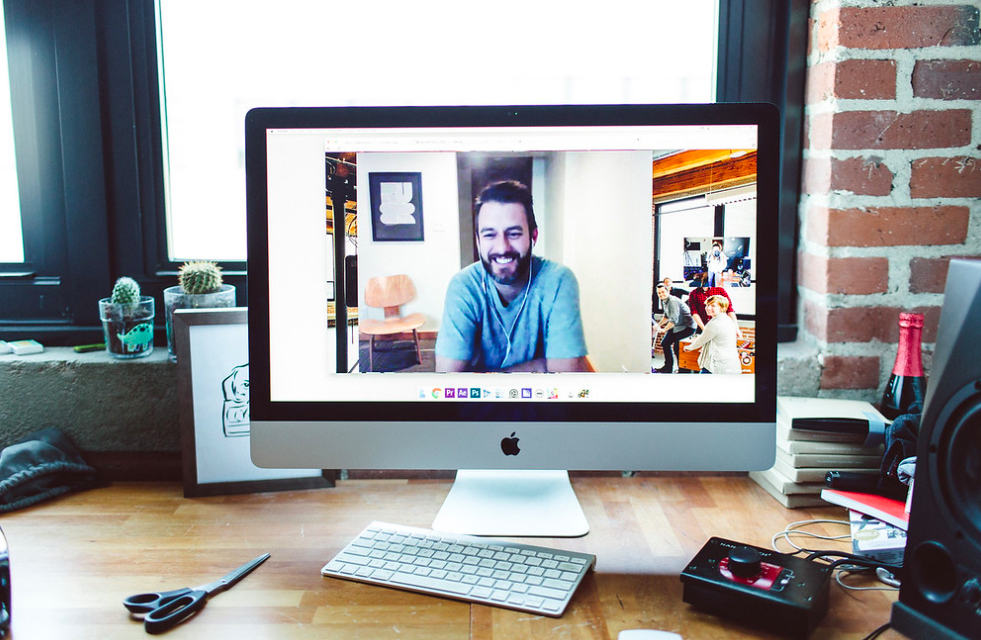From Sight to Sound: Composing Music for Film and TV
July 20, 2015
Topic tags
In celebration of our recent release of some sweet new tracks for your videos, we set out to learn more about the world of composing.
It’s clear that music has an important role in online business videos, but we wanted to know more about music’s role in all sorts of productions. While background music for business videos is undoubtedly different from film scores, we thought it would be interesting and valuable to gain some insight from composers in both worlds.
Wes Hughes is an award-winning composer and saxophonist currently based in Los Angeles. He graduated from Berklee College of Music with a degree in film scoring, and since then, he has composed music for film, video games, theater productions, and more. When he’s not working on his own projects, Wes serves as music production manager to Oscar-winning film composer Yuval Ron.
We had the pleasure of asking Wes about everything from music’s influence on the viewer to the nuts and bolts of the composing process.
Wistia: How does music affect the viewer’s experience?
Wes Hughes: The music’s main job is to flesh out the emotional and dramatic nuance in a film’s narrative. Often characters’ feelings and motivations remain internal, and music helps guide the audience towards what is important to the story and helps invite them into an experience where they can feel empathy and an emotional connection with the characters onscreen.
“The music’s main job is to flesh out the emotional and dramatic nuance in a film’s narrative.”
Music also contributes a technical framework to help support the progression of a film’s cuts and camerawork. The music can either follow the onscreen action or work against it to help bring out the creativity of how the cinematographer shot the film, and how the editor cut it. If you think about any given chase sequence, like the one below from Casino Royale with a score by David Arnold, the camera is changing from multiple perspectives and characters and showing us a lot of cuts, in quick succession. So the music is serving a functional role of being the “glue” that helps the audience understand how all these different parts fit together into one story. The music helps give the camera cuts cohesion as we move between the characters and the space they are running through.
Sometimes, the music can even be a character in the story. At Berklee, I had the pleasure of studying with George S. Clinton (Austin Powers, Mortal Kombat, The Tooth Fairy). For the Austin Powers series, George showed us how he used the music as a “straight man” to set up all of Mike Myers’ jokes in the film. What makes these films so funny is how inept Dr. Evil seems – his timing plays against the music, so he seems like he is missing all his cues. George and Mike accomplished this by using the timing of the music to play with the audience’s expectations of the spy movie genre.
Wistia: Where do you draw your inspiration from when you’re composing?
Wes Hughes: Before I even start writing any music, I watch the film anywhere from 5–20 times and take detailed notes. I make a graph of the narrative arc, graphs of the cinematographer’s color palette, the style of camerawork, the setting, the style of the costumes, sets, and scenery, I read the script a few times if it is available (I sometimes ask for a copy with the director’s own notes on it if they are feeling generous), and ask the director a ton of questions about their perspective on the film until I can get inside his or her head.
“Before I even start writing any music, I watch the film anywhere from 5–20 times and take detailed notes.”
From this point, I usually go hiking in the mountains (where I end up writing my best music) or do chores around the house. By the end of this process, music usually pops into my head on its own. I rarely write any music down before I absorb the film because otherwise the music ends up making it more like a music video, which serves no one. Often, a film will have something special about it that the director wants to draw attention to and this will inspire my approach. For instance, right now I am scoring a film about vampires. The film is intercut with inserts of the setting sun, which makes up a pivotal part of the story. So I built a series of synth noises from scratch evoking the feeling you get of the sun pinching the back of your neck when you are outside in arid, dry heat so our audience can feel the weight of the sun on them as it sets.
Wistia: What are the most challenging parts of composing for TV and film?
Wes Hughes: For television, the greatest challenge is the scheduling. Typically, for every 30 minutes of television time, you need about 10–15 (sometimes even 20) minutes of music delivered every 1–2 weeks per episode (there are usually 24 episodes for a 30-minute show or 12 episodes for an hour long show per season). To put this in perspective, John Williams has been quoted as being able to write 2 minutes of usable music for full orchestra per day. When you factor in having to make revisions based on the feedback you receive from your director or producers (sometimes starting over from scratch), the timeline can be incredibly intense.
For film, the greatest challenge is finding the right theme. Composers use melodies and themes to help enhance the narrative experience of a film and finding the correct sequence of notes that sits perfectly flush with the picture can be exhausting. Usually once you find your melody, the rest of the music comes very quickly. Most composers compare their writing process to an exponential curve, struggling with writer’s block and having trouble getting started, but moving very quickly once the right idea inspires them as the deadline nears.
Wistia: What does your average production process look like for scoring?
Wes Hughes: The film scoring process occurs in post-production and is usually the last thing added. Officially, I start writing music for the film once the director and editor finalize a locked cut and give me a copy with a SMPTE time code stamp (SMPTE stands for the Society of Motion Picture and Television Engineers. This time code is printed outside the frame of picture and allows me to write music that is accurate down to a frame in the cut). At that point I sit down with the director in what is called a “Spotting Session” where we watch the film together and I take notes on where we both think the music should go and what it should be. Ideally though, I prefer to at least be involved in the filmmaking process in some way much earlier than this (hopefully bouncing ideas off the director and demoing concept material). By the time I join the film team, a lot of the principle crew will have been working on the film for months or sometimes years. Even though I only work on the project for a few weeks or months, I need to contribute an equal share to the film that everyone else has been working on for a much longer time. So since I haven’t shared the creative journey with them, my first job is really to get on the same page as everybody else and catch up. Since I am contributing an important piece to someone else’s artistic vision, I want to make sure I do right by them.
“Since I am contributing an important piece to someone else’s artistic vision, I want to make sure I do right by them.”
Wistia: What are some of your favorite film scores of all time?
Wes Hughes:
- Spartacus by Alex North
- Out of Africa by John Barry
- Hook by John Williams
- Troy by James Horner






